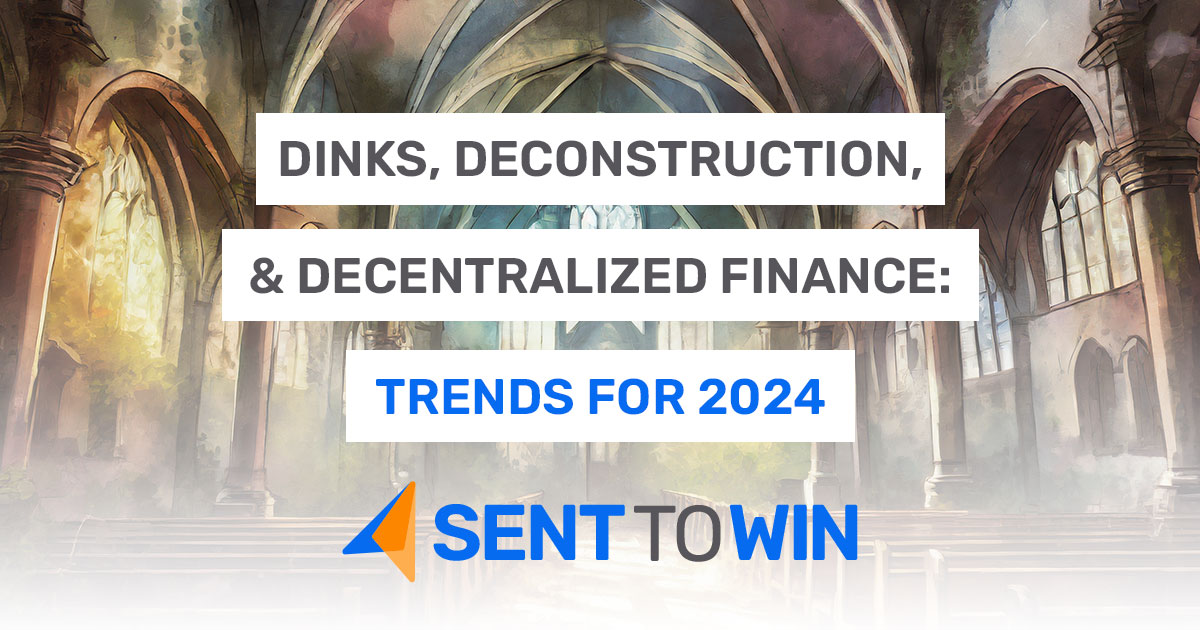DINKS, Deconstruction, and Decentralized Finance: Trends for 2024
In today’s newsletter:
- DINKS, Deconstruction, and Decentralized Finance: Trends for 2024
- Market Watch, Middle Eastern Conflict, and Merry Christmas
- How to Climb the Corporate Ladder
From time to time, it is important for us to take a step back and get a good sense of the big picture – the macroeconomic trends and forces of culture that will end up trickling down and affecting our businesses and ministries. As 2023 winds to a close, we’d like to examine 3 big ideas that show signs of significant impact on our respective bottom lines in 2024 and beyond.
DINKs – The slow movement towards an aging population, niche youth culture, and small-scale consumerism
The United States’ fertility rate dropped to an all-time low in 2020 (1.64 births/woman), and though it has technically increased (1.67 births/woman) since then, the larger trend does seem to indicate further stagnation or perhaps even decline. With the replacement rate sitting at 2.1 births/woman, we find ourselves in a situation where the population is going to continue getting older in 2024, and possibly beyond. With a median age of 38.9, and 10,000 individuals hitting retirement age each year, we are on our way to a situation where most Boomers will be retired by 2030 – and eligible for Social Security and Medicare.
That puts a large strain on the US economy, which already dedicates about 5% of GDP and nearly half of the entire federal budget to Social Security and Medicaid. In 2024 and continuing forward, the solvency issues of these programs (and the resulting pressure on the economy) is going to increase.
So what does this mean?
The American Dream of a house in the suburbs with a white picket fence, a dog, and 2.5 children seems unattainable for many young people, and more attainable goals seem to be taking its place. Travel, Pet care, and the DINK (Dual-Income, No Kids) lifestyle are on the rise on social media, as Millennials and Gen Z increasingly report doubts about whether they will ever be able to afford a home or afford to raise children. Instead, conspicuous consumption, vacations, and other “luxuries” are consolation prizes as people try to make the best of the situation.
Whether DINKs are part of the reason for the economy and demographic shift we find ourselves in or a result of it, their popularity online is a conspicuous element of modern society: Young people are marrying later and later, putting off having children or choosing not to have children at all. Values have continued shifting away from traditional ideals of family legacy to comfort, consumption, personal expression, and unique experiences.
Even the Christian community, which is supposed to hold “Be fruitful and multiply” as one of the most fundamental commands given by God to men, barely outpaces their secular counterparts. Christians in this country have a fertility rate of around 1.9 – still well below the replacement rate, and all things considered, not much better than the 1.6 of their religiously unaffiliated counterparts.
Three takeaways:
- The healthcare industry will continue to grow, due to the aging population.
- Youth culture will become further disconnected from the mainstream, targeting isolated, niche groups according to interests, and it will emphasize conspicuous consumption.
- The real estate market is going to be a rollercoaster ride for the next several years, due to demographic, fiscal, and market forces.
Deconstruction – The steep decline in religious observance, affiliation, and a heavy increase in suspicion and institutional distrust.
According to extensive research by Pew, religion in America continues its unprecedented decline. In 1972, 90% of the population identified as Christian, but today, that number is just 63%, with only about 50% of Americans in their 20s claiming Christianity as their faith.
The past few years have seen many highly visible defections from the faith, and the idea of “deconstruction” gained a lot of steam. Deconstruction does not necessarily mean apostasy, however, as many groups within the church have spoken out against practices and attitudes within modern, American Christianity that need to be corrected in order to align with the Bible’s teaching. For many, reconstruction is going to eventually follow deconstruction, as people arrive at some conclusions after mulling over their questions. Late in 2023, we have even seen some high-profile prodigals, such as the former CCM artist Michael Gungor report that he is actively searching for a church to join.
Evangelicalism tends to grab the headlines, with terms such as “Exvangelical” and “Ex-fundy” framing the discussion, but among former Christians, almost 4 in 10 reports having left Catholicism, and nearly a quarter came from non-evangelical circles. White, evangelical protestant was the background of only 13% of the individuals surveyed who had recently left their faith. Additionally, Americans have been changing denominations at a higher rate than usual.
Over time, this could mean an overall decrease in religious observance in America, but it will likely also mean a radical change or shift in how people who retain their faith worship. It is, perhaps, a related phenomenon that while religious faith declines, so too does faith in our institutions in general.
Americans are changing how they see themselves, increasingly less as “Christian,” and even for Christians, many are on a journey of deciding what aspects of modern, Western Christianity are and are not core to the faith – and to them, personally.
Three takeaways:
- Traditional demographics of market segmentation may be obsolete. “35 years old, Christian, male,” for example, may not be a reliable indicator of a person’s views and goals in 2024.
- Currently churchless believers will look for community and a way of worship that they resonate with.
- The “old” institutions (Record labels, Christian bookstores, and other cultural organizations stemming from the Jesus Movement era, as well as many mainline protestant institutions) will recede, and newer movements will vie for prominence to replace them.
Decentralized Finance – The constriction of traditional lending, the rise of institutionalized crypto trading, AI solutions, and alternative capital-raising.
An inflated U.S. dollar, conflict in Europe and the Middle East, supply chain issues, and the constant possibility of cyberattacks lead us into 2024 with a sense of global instability. This “polycrisis” even involved indications of deglobalization, according to some experts, and the result is that business as usual will continue its leisurely stroll out the door next year.
One of the effects of these troubles is greater institutional interest in cryptocurrency and its promise of decentralized financial substructure. Bitcoin and Ethereum are likely to increase in value in 2024, and most likely significantly increase, if and when Blackrock’s (and Grayscale’s?) Bitcoin Spot ETFs are approved. That expectation has already led to a rise in BTC and ETH valuation, which has proven resilient in the wake of SBF’s and CZ’s respective convictions.
As the market uncertainty continues alongside the rise in cryptocurrency, we will see an increase in dubious market offerings and ICMs for new tokens based on the Ethereum blockchain, so buyers beware. More money flowing into crypto could bring increased scrutiny, and big projects, such as Tether (the dominant stablecoin) could end up in hot water if the market reacts. Investors should pay close attention to movement in the crypto space because the rewards are great, but so are the risks.
Banks have already greatly tightened lending, and though that could ease up some if the Fed decides to reduce interest rates, there is a general shift away from traditional loans by large, commercial banks, such as new business loans and mortgages. New businesses, and existing businesses that want to expand, will have to find new and creative ways of raising capital, as well as leveraging existing methods, such as crowdfunding, angel investors, and venture capital.
The side-gig economy isn’t showing any signs of slowing down, so platforms that empower individuals (Printify, KDP, Shopify, etc.) will do well, but we will also have to endure a rise in MLMs, questionable affiliate marketing training courses, and fake gurus. Thank God for Coffeezilla. Also, thanks to AI business tools, which act as a force multiplier to an individual entrepreneur, we could see an overall reduction in the size of most small businesses – and a proliferation of small businesses that don’t need to raise capital in order to get off the ground and run. Barriers to entry are lowering, on the one hand, and rising on the other.
In other words? Finance in 2024 isn’t quite going to be the Wild West – but it isn’t going to be a pleasant trip down the river either. It’s likely to be a dynamic time, so stay on your toes.
Three takeaways:
- Beware of scams in 2024, as people will be more willing to overlook red flags in the hopes of catching a financial break.
- Get creative when looking for capital.
- Consider investing in the mainstays of the Crypto space, but don’t put all your eggs in the digital basket.
INDUSTRY INSIGHTS
Market Watch, Middle Eastern Conflict, and Merry Christmas
Market Watch
Stocks continue to rise, as investors are increasingly convinced that the Fed will cut interest rates in 2024, even while the Fed cautions that rate cuts are not imminent and that the market has jumped ahead of the policymakers. Unemployment slid down to 3.7% in November, meanwhile, some analysts forecast up to a 2.6% YoY GDP growth for Q4 of this year while also predicting two consecutive quarters of negative growth in 2024. Bitcoin and Ethereum have had a slightly bear week but are up considerably on the month. Disruptions to Middle Eastern shipping lanes have begun to affect the price of crude oil, which is up over $72 presently, after having hit a low point of around $68 just a week ago.
Middle Eastern Conflict
Media sentiment seems to be shifting on the Hamas-Israeli war, as outlets like CNN now frame the conflict in terms of a “Humanitarian Crisis” for Gaza instead of a war on terrorism, the UN general assembly voted overwhelmingly for a ceasefire resolution, and the Pope called a recent military action by the IDF “terrorism.” Meanwhile, the IDF states that it has been extremely cautious in avoiding civilian casualties, successful in killing thousands of terrorists, and now working to finish its campaign rooting out Hamas in Southern Gaza as they look ahead to the next phase of the conflict. Israel may also end up in a full-out war with Hezbollah to the North, as their warnings have not been heeded, and the terrorist organization out of Lebanon continues to fire rockets into Israel. In other news, the US has finally responded to the growing Houthi attacks on shipping in the Middle East, but the Houthis say they are dedicated to continuing to fight.
Merry Christmas
Christmas is upon us again, and in only 5 days people around the world will celebrate Christ’s birth with gift-giving, carols, feasts, and family. We’ll be taking a one-week break from the newsletter, so don’t be alarmed when you don’t see S2W in your inbox next Wednesday, December 27th, but we will be back in your inbox with our in-depth analysis, hard-hitting op-eds, and news from a Christian perspective on January 3rd. We’ve got some great content in the works and can’t wait to share it with you. In the meantime, from all of the team here at Sent to Win, have a Merry Christmas!
Sunday School
Q. Who baptized Jesus?
A. His cousin, John the Baptist. (Matthew 3:13-17)

Seeing the heavy workload, John’s boss leaped into action by hiring two additional layers of management to glare at John until he produces more.
TIPS & TRICKS
How to Climb the Corporate Ladder
with Marcel Becker
Nobody likes to be stuck.
Maybe you’re in a role where you’re stuck with work that feels insignificant, and you’d like to tackle bigger, more important projects. Maybe you’ve been working the same job for some years and you think you deserve an increase in pay, responsibility, and respect. Or maybe you’re trying to mentor someone who’s young and ambitious, and you’d like to help them figure out how to navigate their organization.
There’s no reason to lose hope. Our faith teaches us about Joseph, who climbed out of slavery and became the second most powerful man in Egypt, because of his “excellent spirit,” and Daniel, a prisoner of war, who became the most trusted advisor in all of Babylon and later Persia because of his “excellent spirit.” But what does it mean to have an excellent spirit? And how do we apply these principles to the modern world of work to climb the corporate ladder to success?
In my mind, there are few people better equipped to give tips on how to do so than Marcel Becker.
Marcel has an incredible personal history, where due to life circumstances, he started his career late in life, with three small kids, no job history, and a dead-end minimum wage job at the docks. But through his tireless dedication and a pragmatic work philosophy, Marcel climbed the ranks until he owned the company he had previously worked for. Today, Marcel counts numerous waterfront mega-operations in his employment history and is known as a titan of the industry. He sits on influential boards, and has been recognized numerous times for his civic contributions, financial stewardship, and service. Now currently heading up operations for Propulsion Controls Engineering, Marcel is a sought-after talent in his field who has consistently demonstrated an ability to ascend in responsibility and prominence, regardless of who he works for. He exemplifies that excellent spirit we read about in Old Testament stories.
I sat down with Marcel to ask him his thoughts on how anyone can rise in leadership.
Marcel is a serious-looking individual, with gray hair well-earned, professional attire, and a courteous, open demeanor. After exchanging greetings and briefly catching up, he was quick to get down to business.
“It’s not rocket science,” he says of climbing the corporate ladder. “If I had to summarize it all into one main theme, it’s to take every opportunity to exceed expectations and distinguish yourself. You’ve got so many folks who get stuck in a pattern of saying, ‘Hey, it’s not in my pay grade,’ or ‘That’s not my job,’ so they end up just swimming in the stream, not making any headway. But it’s all about distinguishing yourself to leadership.”
To Marcel’s way of thinking, fulfilling your job description is the minimum that is required of an employee, when oftentimes we can feel like we deserve a pat on the back just for fulfilling what we are paid to do. Marcel says getting noticed is all about going the extra mile.
“The only way you’re going to distinguish yourself is by doing the extraordinary,” he says. “If you’re in an environment where production counts, you can practice what I call the ‘20 Minute Dividend.’ That’s where you show up 5 minutes early every day, work 5 minutes into lunch, leave lunch 5 minutes early, and stay 5 minutes after quitting time. Then every day, you’re gaining an extra 20 minutes of production. In a week, that’s an hour and 40 minutes. In a month, that’s half a shift. After 6 months, you’ve produced a week more than everyone else in the room. That extra investment will distinguish you so that anybody can see it.”
It sounds like simple advice – and it is – but there’s more to it. If you’re consistently following the 20-minute dividend as Marcel describes it, people will get used to thinking of you as one of the first people getting to work, one of the last people to leave, and someone who cares about the goals of his team more than the sanctity of his lunchtime. All excellent branding if you want to be put in charge.
“I’m a big champion of social graces,” Marcel adds. “Be polite, be courteous, and really make an effort to be a pleasant individual. Nobody understands how much people appreciate working with and working for a pleasant person. It’s just that simple.
“Another thing that I would encourage people to do,” he continues, “is not to be emotional at work. Let’s admit it; there are a lot of situations at work that can really get under your skin. But emotion makes absolutely no contribution to any [professional] situation whatsoever. All it’s going to do is distract you from the issue at hand, and when you come off of that cloud, you’ll still be faced with it. So why don’t you just start with the issue and forgo the emotional journey? That takes an amount of discipline, though.”
When I asked him if he could name some reasons an ambitious person might get stuck in a job, unable to move up, he was quick to provide me with an answer and some insight.
“When you’re in charge of a certain function or business unit, you have to go the extra mile to completely understand the yardstick. We’re all measured by something. In my world, it’s financials, so I need to know how my financials work inside and out, from the balance sheet to the profit and loss statement, to individual projects on how their earned value analysis works. You have to have subject matter fluency. If you don’t, that will be a major impediment to your ability to advance. If you don’t understand the yardstick, when it comes time for accountability, you’re going to be left in the cold.”
In other words, you can’t just throw your hands up and say, “I’m not an engineer,” if there are engineers on your team, or “I’m not a numbers guy,” if your department involves accounting. You don’t have to do everyone else’s job, but if you want to prove to your superiors that you can manage a diverse group that handles various aspects of the company, you need to have a handle on how it all works.
“Remember,” Marcel adds, “The quickest way to advance is to help get your boss advanced. When your boss moves up, that creates a leadership vacuum – and who do you think is going to fill that leadership vacuum? The guy who always goes the extra mile, who shows up on time, who always does more, who is the politest person to deal with, with a great attitude, or is it going to be the guy who says, ‘Hey, that’s not my job’?”
As we ended our interview, I realized that it was 6 am in California, where Marcel works, and that he had already been in the office for an hour. He practices what he preaches, and if you want to move up in your company, it might be worth taking his advice.
Marcel Becker is an industry leader in waterfront operations and works as the Vice President of Propulsion Controls Engineering in San Diego, CA. He regularly gives talks as a motivational speaker and works with Second Chance San Diego to inspire ex-convicts to reform and improve their lives through honest work. Read about Marcel’s incredible life story in Free at Last: trading a Life of Crime for Family, Faith, and Success in Business.
Quick Hits
- Google agrees to pay a $700 million settlement and make changes to its Google Play app store.
- Existing home sales fell to a 13-year low recently, sending ripples through related industries.
- At Pope Francis’ direction, the Catholic Church may now bless same-sex unions, in a move that has angered conservative Catholics and many Protestants.
- A new study demonstrates that Tesla has the highest rate of accidents of any car brand.
- The VR market continues to shrink, even as Meta injects billions.
Guess the Prompt
Our “Trends for 2024” graphic was generated using AI prompts. Guess the prompt for your chance to win Sent To Win gear. Just reply to this email with your best guess.
For Kingdom Leaders, By Kingdom Leaders
Bringing Kingdom-minded leaders like you fresh perspectives and insights on business, finance, and leadership trends.








